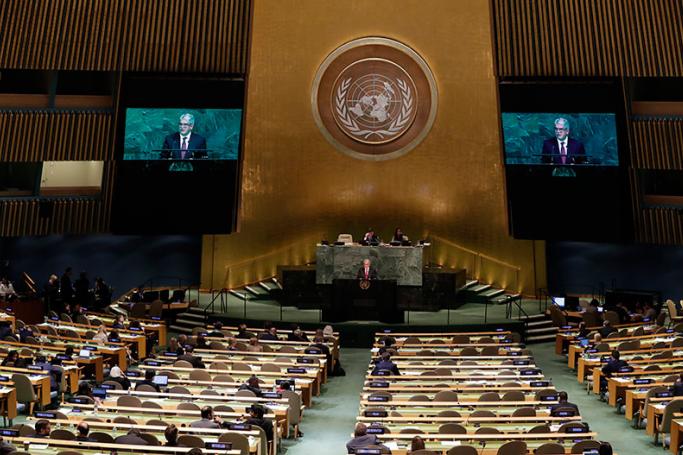France, Britain, the United States and four other countries have asked the UN Security Council to meet next week to discuss the ongoing violence in Myanmar, according to a request seen by AFP on Friday.
The call comes as fresh attacks were reported in Myanmar’s Rakhine State and “hate speech” on social media worsens the crisis with dangers of intercommunal tensions spreading to other areas of the country.
Twenty homes caught fire and a bomb was detonated near a mosque in Rakhine state, the government said Friday, the latest unrest in a region that has seen hundreds of thousands of Rohinyga Muslims flee in under a month.
The seven countries including Egypt, Kazakhstan, Senegal and Sweden want UN Secretary-General Antonio Guterres to brief the council on Myanmar's military campaign against Rohingya Muslims in Rakhine state.
The Ethiopian presidency of the council said it was holding consultations to set a time for the meeting.
The United Nations says more than 420,000 Rohingya have fled for safety to Bangladesh.
The United Nations will need $200 million over the next six months to face the "catastrophic" influx of more than 420,000 Rohingya refugees to Bangladesh, a top UN official said Friday.
An NGO claimed the camps in Bangladesh were on the brink of a “health disaster”.
The military operation in Myanmar was sparked by attacks carried out by a group calling itself the Arakan Rohingya Salvation Army (ARSA) on police posts on August 25.
The Security Council has called for an end to the violence but rights organizations have said the exodus has continued, fueling international outrage.
The United Nations has described the military operation as "ethnic cleansing" and French President Emmanuel Macron went further, describing it as "genocide."
The latest violence saw 20 homes catch fire in Maungdaw's Kyain Chaung village on Thursday night, according to a statement posted by the Myanmar government's Information Committee.
"Security members went and checked the fire and are investigating its cause," said the statement, adding that the flames burned through a community previously hit by fire.
The following morning a bomb detonated outside of a mosque in Mi Chaung Zay village in nearby Buthidaung township, according to the government.
The statement said "terrorists" were to blame for the blast, without specifying if they were linked to ARSA, the group behind the ambushes on police posts.
No deaths or injuries were reported in either incident.
Myanmar's government admits that scores of villages have been burned down over the past month.
But it has previously accused Rohingya terrorists of setting the fires and driving the communal violence that has also displaced some 30,000 Buddhists and Hindus.
Those refugees have largely fled south, with some cramming into temples and even a derelict football stadium outside the state capital of Sittwe.
The government has blocked independent media access to the conflict zone in northern Rakhine, making it difficult to verify the swirl of claims and counterclaims that has amplified Myanmar's already bitter ethnic divides.
Hate speech on social media is aggravating the crisis, according to a US official.
After a three-day visit to Myanmar, including a stop in Rakhine's state capital Sittwe, US Deputy Assistant Secretary of State Patrick Murphy called on community leaders to condemn hate speech cascading across the web in the former junta-run nation.
"One of the newer factors adding to the complexities (in Rakhine) is the platform that social media now offers. There is a lot of hate speech, there is a lot of misinformation," Murphy told media in a telephone briefing.
He urged the "better angels" of the Myanmar people to find empathy for the Rohingya.
"What we are doing is appealing to the many, many populations in Burma... to remember their own experience and show some compassion regardless of the political complexities for the Rohingya people," Murphy said.
(AFP, Mizzima)
You are viewing the old site.
Please update your bookmark to https://eng.mizzima.com.
Mizzima Weekly Magazine Issue...
14 December 2023
New UK Burma sanctions welcome...
13 December 2023
Spring Revolution Daily News f...
13 December 2023
Spring Revolution Daily News f...
12 December 2023
Spring Revolution Daily News f...
11 December 2023
Spring Revolution Daily News f...
08 December 2023
Spring Revolution Daily News f...
07 December 2023
Diaspora journalists increasin...
07 December 2023
PPP candidate interested in extracting resources from mountains east of Pyinmana












